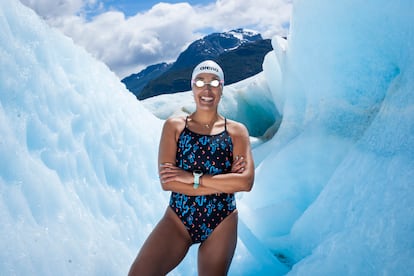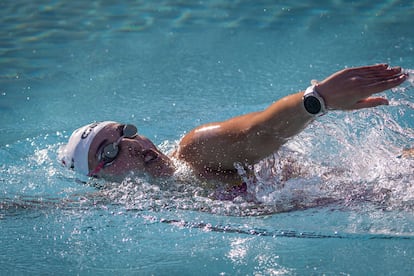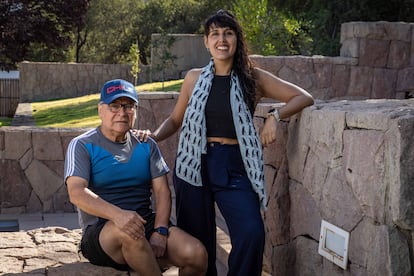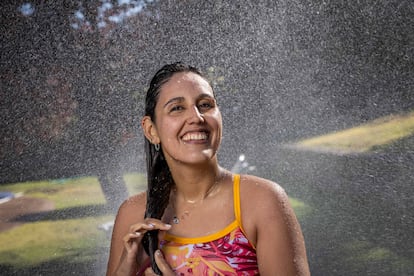From Siberia to Antarctica: Meet the Chilean swimmer who pierces the icy oceans
Bárbara Hernández has just broken a Guinness World Record for swimming in the frozen waters south of her home country


They call her the Ice Mermaid. And although Chilean ice-water swimmer Bárbara Hernández has grown to like the nickname, she would prefer something along the lines of Tonina (the Chilean dolphin). “How come they get to be sharks, and I’m a mermaid?” she asked after a morning training session in the pools of one of her sponsors, the Universidad Católica Sports Club, in the city of Santiago. Arranging a meeting with Hernández was not an easy task; the athlete has hardly set foot in Chile this year. She started 2023 competing in the International Ice Swimming Association World Championship, in France, where she won seven medals. Then she embarked on a trip to Antarctica, where she became the first person to swim 2.5 kilometers (1.6 miles) in the frozen waters, and on Sunday, February 26, she was going to New Zealand to cross the Cook Strait, a distance of approximately 27 kilometers (16.8 miles), in an attempt to be just one location short of completing the Seven Seas challenge.
For two hours, Hernández swims at an exact pace from one end of the pool to the other. Gabriel Torres, 77, her coach since she was nine, lets her know with a shout every time she completes a kilometer. He explains that this is just a light training session to recover from the 20 days the swimmer spent in the extreme south. Normally, training lasts four hours, Monday through Saturday. “After the Antarctic, this is Cancun to me,” joked Bárbara as she turned her head towards the sun to shake off the remnants of a cold that still seems to be chilling her bones. On February 6, she swam in a bathing suit for 45 minutes and 30 seconds in Antarctic waters at 2 degrees Celsius (35 degrees Fahrenheit), to bring attention to the conservation of the ecosystem in the extreme south of the planet.

Upon completing the feat, Hernández’s body temperature was 27 degrees Celsius (80.6 Fahrenheit). “The hypothermia was severe, I was no longer shivering. When I got out of the water I was kind of out of it. It was super tough for my team, but I was happy, my job was done, and I knew I was going to be taken care of,” she said, still excited. The 60 sailors from the Chilean Navy tugboat Janequeo (ATF-65) welcomed her with the song Gonna Fly Now from the movie Rocky, while health workers specialized in hypothermia provided her with the necessary assistance. “It was a very controlled recovery. I have no bad memories,” she said. This week, she received confirmation of her entry into the Guinness Book of Records for her achievement.
The athlete grew up in a modest home in the city of Recoleta, a commune north of the country’s capital, where going to the sea was something exceptional. “To me, swimming was a privilege; I think that’s why I love it so much,” she said. Her first memories are of her playing with her father in the waves of cold, gray beaches. “Nobody likes them, but I remember them with lots of love because I would come out of the water and my mom would be waiting for me with hot chocolate.” Her instantaneous fascination with water motivated her parents to pay for swimming lessons – with great effort – at the University of Chile. Gabriel recalls that, although she was not the best, her persistence made her stand out. “Swimming is 80% mental and 20% physical,” he pointed out.

At the age of 17, Bárbara competed for the first time in open water in the Corral-Niebla stretch, in the southern city of Valdivia, and became the first woman to win. “After spending my teenage years crying because I competed in pools and I did terrible and no matter how much I trained I wasn’t a champion, I found something I was good at,” she said. In addition, in this kind of competition she could swim with a swimsuit instead of a neoprene suit, something mandatory in other tournaments for safety reasons. This is something the athlete always wanted but could not find elsewhere.
“It’s my way of connecting with nature. I’m kind of a purist, but it is the human who has to adapt. [And choose] not to intervene as much as we can so as not to feel cold, pain or fear. The ultimate goal is to accommodate all those states and see that they are not greater than my fire, which is my heart, or the love of those close to me,” explained the athlete and psychologist by profession.
In 2014, she was invited to swim in the Perito Moreno glacier, in the Argentine Patagonia, at 5 degrees Celsius (41 Fahrenheit) and without neoprene. That time, she only told her closest circle that she was going to venture into the frigid waters. “I didn’t want people telling me that I wasn’t going to be able to do it, a very Chilean thing,” she said. “I was afraid, I was super nervous, I had never seen so much snow in my entire life, I had never seen a glacier, I didn’t even know swimming there was possible…” Once again, she won. Since then, she has twice been ranked number one in the icy water rankings. And she has traveled the world breaking records.

She was the first Chilean to swim the English Channel, a feat that took more than 12 hours. She won 10 medals (three gold) in the 2019 International Ice Swimming Association World Championship, in Siberia, and the following year she became the first person to cross Chungara Lake, located 4,560 meters above sea level, in the north of Chile. In 2021, she became the first Latin American woman to swim two laps around Manhattan Island, completing 94 kilometers in 20 hours and 30 minutes. Her list of achievements grows every year. Where does she get the strength? “I swim with my emotions,” she said, “that’s why, when a big swim ends you feel like you’ve lost something, a part of you stays in that place, and you have to mourn it a bit.”
Until two years ago, she used to organize raffles to raise money to attend major events, where registration alone can cost $6,000. Therefore, she works hard to receive sponsorships. The main ones come from the Foundation of Chilean tycoon Andrónico Luksic, the Bank of Chile and the Ministry of Sport. But raising funds to compete in a non-traditional sport is not an easy task. That is why the swimmer’s favorite moment is when she is in the water: “That’s when I can give it my all, focus on my stroke, my breathing, where I’m going, where to draw strength from, what to do with the fear. All that is mine.”
Barbara will be in New Zealand until March 4 to try to cross the Cook Channel. What does she think about during 15 hours of swimming? “Just as the price of a swim is paid in advance, you train your thoughts before a marathon like this. You have to work on the internal dialogue beforehand. It obviously scares me because it matters to me, and it matters to me because I’ve been waiting for this opportunity for five years, but if I don’t make it, it’s all right. I’ll cry for a while and come back in 10 years.” Whatever happens, in July, the Tonina will try her luck in the Tsugaru Channel, in Japan, with her sights set on reaching a new achievement: being the first South American to complete the route known as Seven Seas, which includes the channels Moloka’i (Hawaii), Catalina (California), La Mancha (England and France), North (Scotland) and Tsugaru, as well as the straits of Gibraltar (Spain and Morocco) and Cook.
Tu suscripción se está usando en otro dispositivo
¿Quieres añadir otro usuario a tu suscripción?
Si continúas leyendo en este dispositivo, no se podrá leer en el otro.
FlechaTu suscripción se está usando en otro dispositivo y solo puedes acceder a EL PAÍS desde un dispositivo a la vez.
Si quieres compartir tu cuenta, cambia tu suscripción a la modalidad Premium, así podrás añadir otro usuario. Cada uno accederá con su propia cuenta de email, lo que os permitirá personalizar vuestra experiencia en EL PAÍS.
¿Tienes una suscripción de empresa? Accede aquí para contratar más cuentas.
En el caso de no saber quién está usando tu cuenta, te recomendamos cambiar tu contraseña aquí.
Si decides continuar compartiendo tu cuenta, este mensaje se mostrará en tu dispositivo y en el de la otra persona que está usando tu cuenta de forma indefinida, afectando a tu experiencia de lectura. Puedes consultar aquí los términos y condiciones de la suscripción digital.








































